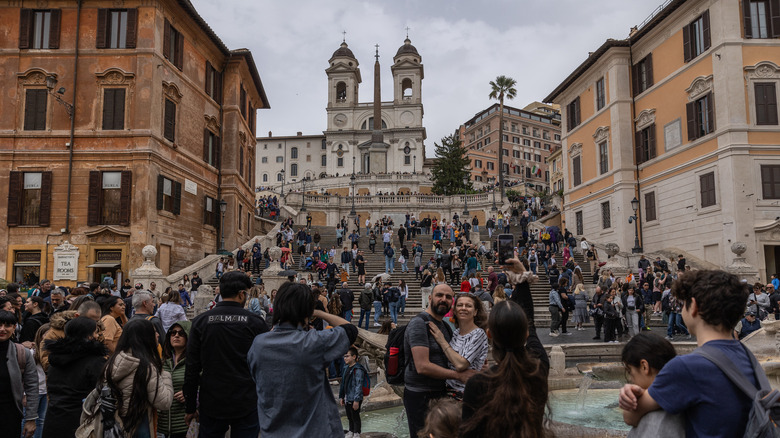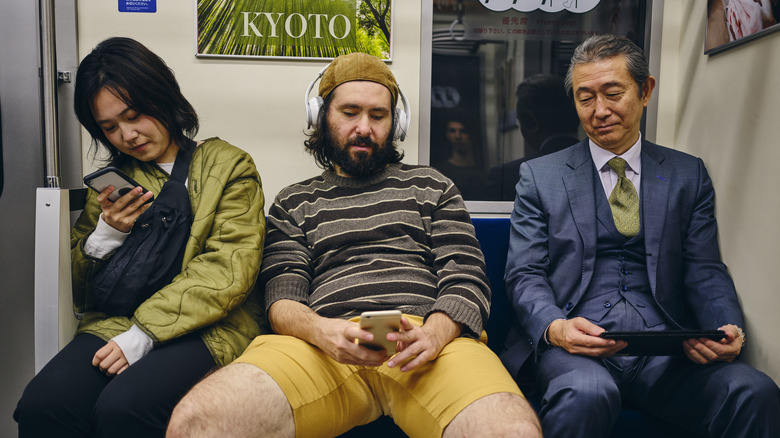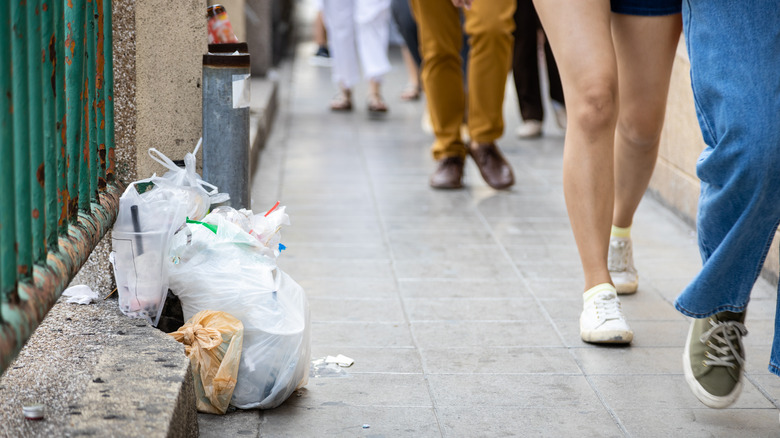The Best Ways To Avoid Being What Rick Steves Calls The 'Ugly Tourist'
They walk around with selfie sticks and travel to hotspots like Capri, Bali, and Santorini only to take pictures. They go to Hard Rock Cafes, McDonald's, and Starbucks in places like Barcelona, Berlin, and Bologna. They think that everyone is out to rip them off, that food prepared without gloves is poison, and that in-and-out day trips are the best way to see Venice — which, to them, is nothing but an amusement park. They lug around massive suitcases full of stuff for a one-week trip, and make shopping their top priority. They demand AC, they must have the English-language menu, and they love the safety and comfort of tour buses. They say "thank you" instead of learning "grazie," "merci," or "danke."
This is what travel expert Rick Steves calls the "ugly tourist," and you know one when you see one — unless you might be guilty of being one yourself. The "ugly tourist" phenomenon has nothing to do with looks and everything to do with inconsiderate behavior, ethnocentric perspectives, and a superficial travel style. These are the worst types of travelers, and whether intentionally or unintentionally, they ruin trips not only for themselves but for others. Not to mention the bad impressions and nuisance they impose on the locals! Steves explains that being an ugly tourist is a kind of disease. The only cure? A serious change in attitude. Here are some of the best ways to avoid being an ugly tourist so you can enjoy respectful and beautiful travels.
Travel like a cultural chameleon
One of the simplest yet most effective ways to show respect, suggests Rick Steves, is to learn a few essential words and phrases in the local language. Greetings, thank you, please, and sorry are simply indispensable. Even if your pronunciation isn't perfect, the attempt itself is appreciated. You can talk the talk, but you also have to walk the walk, and that includes adhering to local dress codes. Some destinations are more relaxed, while others have specific guidelines, especially concerning religious sites or conservative cultures. For example, in many European churches, covering your shoulders and knees is expected, and in certain Asian countries like Malaysia, modesty is important. Researching appropriate attire before you pack can help you blend in and show respect.
Ultimately, every culture has its own customs that might differ significantly from what you're used to. Whether it's tipping practices, dining manners, or social norms, taking the time to learn and follow these can make a big difference. For instance, in Japan and China, it's considered rude to tip, while in America, tipping around 20% is customary. Embrace the differences and view them as part of the adventure — even if travel can sometimes be frustrating due to language barriers, different ways of doing things, and unexpected challenges. Maintaining patience and an open mind is crucial. Rick Steves recommends becoming a "cultural chameleon" and a "temporary local." Challenge yourself with the Italian-language menu, join the late-dinner culture in Spain, and bargain respectfully in Thailand.
Little things go a long way
Being a responsible traveler also means being mindful of your environmental impact. This includes not littering, respecting wildlife, and being conscious of your footprint. Many destinations, like Venice and Dubrovnik, are struggling with overtourism, which puts a strain on their natural resources. This responsibility extends to man-made monuments as well, as many famous landmarks have been left damaged or disturbed over the years — from one couple who inscribed their initials in the Colosseum, to a tourist who drove a Maserati down the Spanish Steps. Locals are sick and tired of boorish tourists and are revolting with anti-tourist protests in places like the Canary Islands.
This recent peak in ugly tourism may be due to the influence of social media, where bad-behavior content and selfie-stick narcissism get maximal engagement. Rick Steves advises compulsive photo-takers to put down their cameras and engage with the culture and destination they came to see directly, not through a viewfinder. Photos are great souvenirs, but you just might miss the moment or ruin it altogether while trying so hard to capture it. Speaking of souvenirs, one of the best ways to positively impact the places you visit is by supporting local shops, restaurants, and markets instead of international chains — plus, you'll get a more authentic travel experience. Steves also warns against falling prey to the allure of the tourist shop. Better yet, forgo compulsive shopping altogether and focus your travel energy on immersion, respect, connection, and beauty — no "ugly" necessary.


